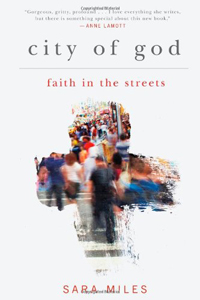Book Notes
 Sara Miles, City of God; Faith in the Streets (New York: Jericho Books, 2014), 205pp.
Sara Miles, City of God; Faith in the Streets (New York: Jericho Books, 2014), 205pp.
Fifteen years ago, Sara Miles walked into Saint Gregory's Episcopal Church in San Francisco "without premeditation," partook of the eucharist, and experienced a radical conversion. She had never heard a gospel reading, never said the Lord's Prayer, and knew only one person who went to church. She was forty-six, a blue-state, secular intellectual, a lesbian, and a left-wing journalist with habits of deep scepticism from covering revolutionary movements in Central America. She tells this story in her book Take This Bread (2007).
That book was followed by Jesus Freak (2010), which describes the food pantry program that Miles started in 2000. Free food was a deliberate extension of the eucharist, and an imitation of the way Jesus used table fellowship as a sign of God's kingdom. Setting up food around the church altar, every Friday the pantry gives away free groceries with no questions asked and no forms to fill out to about 800 families. The pantry is run by church volunteers, misfits, and oddballs who have benefited from the ministry. Another eighteen similar pantries have been jump-started as a result of Miles sharing her story both locally and nationally.
City of God describes Miles' transformation from a "respectable church goer" to a "lunatic evangelist" when in 2010 she joined a small group of people who took the Ash Wednesday imposition of ashes into the streets of her San Francisco neighborhood. She "wanted to get beyond the tastefully enclosed museum of religious life." So, they hit the streets of this most secular of cities. They knelt in McDonalds, at bus stops, and on the sidewalks in their black cassocks to pray and impose ashes.
Yes, she felt "self-conscious, fraudulent, awkward, [and] exposed." But guess what? People loved it. Why were people so eager for ashes and so effusive with gratitude? Ash Wednesday, it turns out, is "the most honest of days" when the church reminds you of what no one else in society will say — that from dust you came and to dust you will return. We admit that we've made a mess. In other words, "the truth is a blessing."
City of God is mainly about taking this Lenten liturgy to the streets, but it's also much more. Miles wonders about the changing demographics of her urban neighborhood. After twenty years in the same house with her partner Martha, she asks what it means to be a neighbor. She explores what it means to express personal faith in a public setting. What other lessons might we learn with similar experimental liturgies and ecclesiologies? Miles asks hard questions. She never sentimentalizes her subjects or gives herself a free pass. This book was another confirmation that any book by Sara Miles is an automatic read for me.


